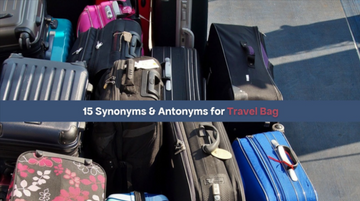The concept of a travel bag has evolved significantly throughout human history, becoming an integral part of our journeys and cultural experiences. Understanding the various terms and alternatives for travel bags enriches our vocabulary and helps us communicate more effectively about these essential companions of modern mobility.
Understanding Travel Bags
A travel bag fundamentally serves as a portable container designed for carrying personal belongings during journeys. These versatile carriers have transformed from simple sacks into sophisticated carrying solutions that accommodate diverse travel needs. Evolution reflects both technological advancement and cultural influences across different societies.
Traditional Terminology
The formal lexicon of travel bags includes several sophisticated terms that carry historical significance. The word "valise" represents a classic term that evokes elegance and refinement, while "portmanteau" carries a traditional European flair. The American term "grip" emerged during the era of rail travel, demonstrating how transportation methods influence terminology.
Modern Alternatives in Global Context
Contemporary travelers employ a rich variety of terms that reflect modern lifestyle needs and cultural preferences. The term "carry-on" has gained prominence due to air travel regulations, while "weekender" describes a smaller bag perfect for short trips. In British English, "holdall" remains a popular choice, and Australian travelers might refer to their "tucker-bag," showcasing how regional variations enrich the travel vocabulary.
Professional Industry Terminology
The travel and hospitality sector has developed specific terminology to ensure clear communication across international boundaries. "Baggage" and "luggage" serve as standard terms in aviation and hospitality settings, while "attaché case" specifically denotes business-oriented bags. These professional terms create consistency in global travel communications.
Cultural Variations and Heritage
Different cultures have contributed unique terms and designs to the travel bag lexicon. Belt bags, for instance, showcase diverse cultural influences across regions, from intricate Asian embroidery to bold African patterns. These variations reflect not just practical needs but also cultural heritage and artistic traditions.
Functional Classifications
Travel bags are often categorized based on their intended use and design features. Professional travelers might opt for a "briefcase" or "attaché case," while adventure seekers prefer "rucksacks" or "backpacks." The hospitality industry recognizes various categories including "cabin baggage," "check-in luggage," and "garment bags".
Contemporary Usage Trends
Modern travelers increasingly seek versatile terms that reflect current lifestyle patterns. "Weekender" has gained popularity for short-trip bags, while "carry-on" dominates air travel terminology. These contemporary terms emphasize functionality and purpose rather than traditional naming conventions.
Technical Perspectives
The professional luggage industry employs specific terminology to describe various features and specifications. Terms like "hard-shell," "soft-side," and "spinner" denote different construction types and mobility features. This technical vocabulary helps consumers make informed choices about their travel gear.
Cultural Impact on Design
The influence of culture on travel bag design extends beyond terminology. Different regions contribute unique aesthetic elements, from minimalist Japanese influences to elaborate Middle Eastern patterns. These cultural touchpoints create a rich tapestry of design variations that enhance the global travel experience.
Antonyms and Contrasting Concepts
While direct antonyms for travel bags are limited, understanding contrasting concepts helps define the essential nature of these portable containers. Fixed storage solutions, permanent containers, and immobile cases represent conceptual opposites that highlight the portable nature of travel bags.
Evolution of Travel Gear
The development of travel bags reflects broader changes in human mobility and cultural exchange. From ancient traders' pouches to modern smart luggage, each evolution demonstrates how travel gear adapts to changing needs while maintaining cultural connections.
Conclusion
The diverse terminology surrounding travel bags reflects their essential role in human mobility and cultural exchange. Whether using traditional terms like valise or modern expressions like weekender, these variations enrich our understanding of travel gear while honoring cultural diversity and practical functionality. The continuous evolution of travel bag terminology demonstrates how language adapts to meet changing travel needs while preserving cultural heritage.
FAQ
What is the most versatile synonym for travel bag?
Luggage serves as the most versatile and widely recognized synonym, applicable across various travel contexts and cultures.
How do cultural differences influence travel bag terminology?
Different regions have developed unique terms reflecting their cultural heritage, from British "holdall" to Australian "tucker-bag."
What are the essential types of travel bags?
The main categories include suitcases, backpacks, duffel bags, carry-ons, and weekenders, each serving specific travel needs.
How has modern travel influenced bag terminology?
Air travel has introduced terms like "carry-on" and "check-in luggage," while digital nomads have popularized terms like "tech pack."
What's the difference between luggage and baggage?
While both terms are similar, "luggage" typically refers to personal travel containers, while "baggage" is more commonly used in commercial transport settings.
























